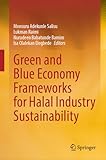Green and blue economy frameworks for halal industry sustainability
Material type: TextPublication details: Singapore Springer 2025Description: xxviii, 399 pISBN:
TextPublication details: Singapore Springer 2025Description: xxviii, 399 pISBN: - 9789819617289
- 338.928 SAL
| Item type | Current library | Collection | Call number | Copy number | Status | Date due | Barcode | |
|---|---|---|---|---|---|---|---|---|
 Book
Book
|
Indian Institute of Management LRC General Stacks | Public Policy & General Management | 338.928 SAL (Browse shelf(Opens below)) | 1 | Available | 009171 |
Table of contents:
Front Matter
Pages i-xxviii
Download chapter PDF
Farm-to-Fork Framework Supply Chain for Integration of Green Economy for Halal Industry Sustainability
Monsuru Adekunle Salisu, Nurudeen Babatunde Bamiro, Isa Olalekan Elegbede, Ridzwan Che Rus
Pages 1-21
Green Technology Framework for Halal Industry Sustainability and Ecosystem Protection
Mansur Muhammad, Safiullah Junejo
Pages 23-46
Halal Opportunities for Women Financial Inclusion in the Blue Economy for Halal Sustainability
Wasilat Fayokemi Adigun, Jamiu Muhammad Busari
Pages 47-72
Contemporary Discourse of Shari’ah Perspective on Blue Economy for Halal Industry Sustainability
Saheed Afolabi Ashafa
Pages 73-88
Maqasid Al Shari’ah Perspective on the Green Economy for Halal Industry Sustainability
Naelati Tubastuvi, Arienda Gitty Ramadani
Pages 89-99
Strategies for Maritime Excellence and Environmental Impact Mitigation Through Halal Practices
Abdulwakil Olawale Saba, Monsuru Adekunle Salisu, Hussein Aliu Sule
Pages 101-116
Entrenching Green and Blue Economy Sustainability Through Halal Supply Chain Management
Rafiu Kunle Showole, Haruna Babatunde Jaiyeoba, Ibrahim Adeniyi Abdur-Rauf
Pages 117-131
Mainstreaming the Fast-Growing Halal Industry Within Blue and Green Economic Models for Sustainable Development
Basirat Olaide Raimi
Pages 133-149
Development of Shari’ah Framework for Halal Policy and Standards for Integrating Blue Economy for Halal Industry Sustainability
Lukman Raimi
Pages 151-170
Sustainable Halal Management, Branding, and Marketing Strategies for Blue and Green Products
Iddrisu Mustapha, Abdul-Hamid Mustapha
Pages 171-204
Development of a Sustainable Economic Framework for the Blue and Green Halal Industry: Issues, Challenges, and Opportunities
Kayode Omowunmi Ahmed, Nurudeen Babatunde Bamiro, Monsuru Adekunle Salisu, Zainizam Zakariya
Pages 205-219
Halal Fisheries and Aquaculture: Science-Driven Sustainability Practices
Idris Adewale Ahmed, Maryam Abimbola Mikail, Farid Bin Che Ghazali, Abdulwakil Olawale Saba
Pages 221-232
From Ocean to Plate: The Potential of Blue Economy Products for Halal Industry Sustainability
Abdulwakil Olawale Saba, Rasheed Olatunji Moruf, Somod Dapo Olohunlana, Shamsu Ibrahim Ishaq, Idris Adewale Ahmed, Sekinah Adenike Yusuf-Saba et al.
Pages 233-252
Sustainable Halal Financing Framework for Blue and Green Economy
Abdulmaliik Adeyanju Oseni, Nurudeen Babatunde Bamiro, Saheed Afolabi Ashafa, Somod Dapo Olohunlana
Pages 253-273
Development of Sustainable Value Chain Framework for Halal Opportunities in Green Economy: A Systematic Review
Rodiyah Lolade Qadir, Muhdawwal Aremu Eleshin, Afeez Muhammed Adebayo
Pages 275-299
Contemporary Discourse on the Farm-to-Fork Concept of the Blue Economy: Exploration for Halal Industry Sustainability
Lukman Raimi, Uthman Adekunle Animashaun
Pages 301-325
Transforming Halal Coastal Tourism for Financial Inclusion and Economic Growth: Threat, Challenges and Opportunities
Nurudeen Babatunde Bamiro, Azeez Oluwatosin Oshoba, Isiaq Oluwatosin Yahya, Qian Li
Pages 327-345
Conceptual and Practical Dimensions of Islamic Finance for Sustainable Blue Economy for Halal Sustainability
Ibrahim Adeniyi Abdur-Rauf, Engku Muhammad Tajuddin Engku Ali, Sekinah Adenike Yusuf-Saba, Rafiu Kunle Showole
Pages 347-367
Halal Harvesting: Exploring Aquatic Seafood and By-products as Ethical and Sustainable Alternatives for Fisheries
Isa Olalekan Elegbede, Monsuru Adekunle Salisu, Abdulwakil Olawale Saba, Raimot Titilade Akanmu, Lateef Badmos, Sarat Olaleye-Haroun et al.
Pages 369-399
[https://link.springer.com/book/10.1007/978-981-96-1729-6]
This book serves as a valuable resource for economic policymakers, economic analysts, halal trainers, halal stakeholders, agribusiness advocates, and halal industry consultants in the rapidly changing emerging green and blue economy. The book explores the themes of green and blue economies for halal industry sustainability and business entrepreneurship as well as production and consumption, ethics and impact investments in halal, green and blue entrepreneurship, and principles governing the innovation of production framework through integration of green and blue economy. The green and blue economy frameworks can be applied to the Halal industry to enhance its sustainability and promote environmental and social responsibility. This book presents the emerging blue and green economy to halal entrepreneurs as a complementary alternative model for enterprise development, wealth creation, employment creation, responsible production, and sustainable consumption and a catalyst for attaining sustainable development goals.
(https://link.springer.com/book/10.1007/978-981-96-1729-6)
There are no comments on this title.

